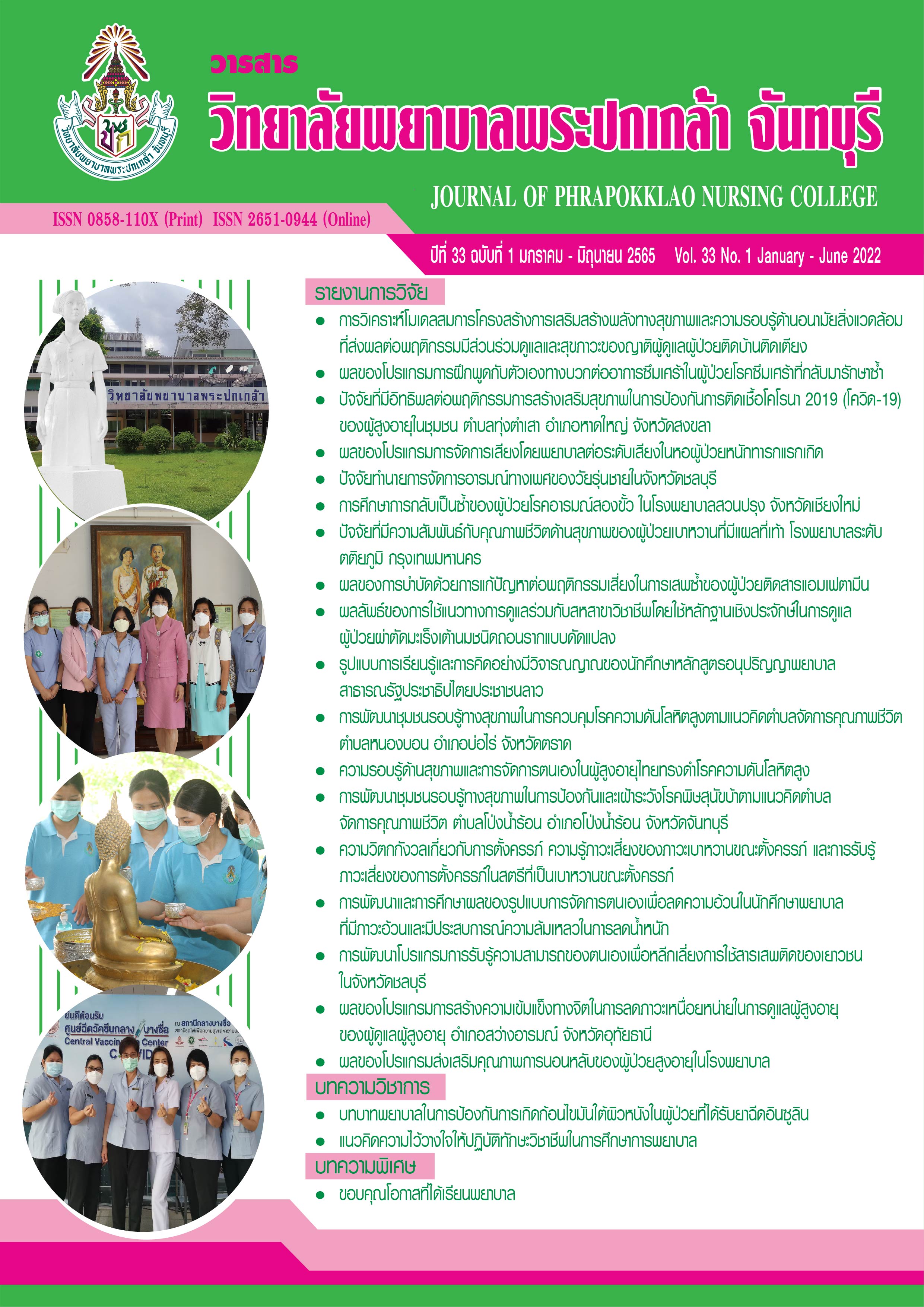Health Literacy and Self-management among Black Tai Older Persons with Hypertension
Keywords:
Health literacy, Self-management, Black Tai older persons, HypertensionAbstract
This descriptive correlational research aimed to examine the relationship between health literacy and self-management among Black Tai older persons with hypertension. The samples consisted of 82 Black Tai older persons with hypertension who received the medical care at the sub-district health promoting hospitals in Khao Yoi District, Phetchaburi Province. The research instruments included the demographic data form, the health literacy scale for Black Tai older persons with hypertension with reliability as .83, and the self-management scale for Black Tai older persons with hypertension with reliability as .88. Data were collected from April to June, 2020. Statistics used for data analysis included frequency, percentage, mean, standard deviation, and Pearson’s product moment correlation.
The research results revealed that the mean scores of health literacy and self-management among Black Tai older persons with hypertension were at a moderate level (M = 34.84, SD = 4.85 and M = 75.26, SD = 8.95, respectively). Health literacy was positively statistically significantly related to self-management among Black Tai older persons with hypertension (r = .432, p < .001).
This research suggests that health care providers should access health literacy and self-management among Black Tai older persons with hypertension in order to enhance their health literacy and self-management. As such, Black Tai older persons with hypertension will provide more suitable disease control.
References
กรรณิการ์ การีสรรพ์, พรทิพย์ มาลาธรรม, และนุชนาฏ สุทธิ. (2562). ความสัมพันธ์ระหว่างความรอบรู้ด้านสุขภาพ ความรู้เกี่ยวกับการควบคุมโรคความดันโลหิตสูง และพฤติกรรมการดูแลสุขภาพของผู้สูงอายุที่เป็นโรคความดันโลหิตสูง. รามาธิบดีพยาบาลสาร, 25(3), 280–295.
กฤษณาพร ทิพย์กาญจนเรขา, และสำลี สาลีกุล. (2562). บทบาทพยาบาลในการป้องกันและการจัดการกับการใช้ยาที่ไม่เหมาะสมในผู้สูงอายุ. วารสารพยาบาลทหารบก, 20(1), 31–39.
กานต์ทิตา สีหมากสุก, และบุญรอด บุญเกิด. (2559). วิเคราะห์ปัจจัยการดำรงอยู่และการเปลี่ยนแปลงความเชื่อในพิธีกรรมของไทยทรงดำ: กรณีศึกษาเขตตำบลหนองปรง อำเภอเขาย้อย จังหวัดเพชรบุรี. วารสารวิชาการมนุษยศาสตร์และสังคมศาสตร์ มหาวิทยาลัยบูรพา, 24(44), 83–102.
จริยา นพเคราะห์, โรจนี จินตนาวัฒน์, และทศพร คำผลศิริ. (2563). ความรอบรู้ด้านสุขภาพและการจัดการตนเองในผู้สูงอายุที่เป็นโรคเบาหวานชนิดที่ 2. พยาบาลสาร, 47(2), 251–261.
ณรงค์ อาจสมิติ. (2555). รัฐชาติ ชาติพันธุ์ และอัตลักษณ์ไทดำ. วารสารสังคมวิทยามานุษยวิทยา, 31(2), 53–78.
เบญจมาศ ถาดแสง, ดวงฤดี ลาศุขะ, และทศพร คำผลศิริ. (2555). ผลของโปรแกรมสนับสนุนการจัดการตนเองต่อพฤติกรรมการจัดการตนเองและค่าความดันโลหิตของผู้สูงอายุที่มีโรคความดันโลหิตสูง. พยาบาลสาร, 39(4), 124–137.
พนิดา จันทร์ดีแก้วสกุล, นันทิยา วัฒายุ, และนันทวัน สุวรรณรูป. (2561). ปัจจัยทำนายพฤติกรรมการจัดการตนเองของผู้ป่วยความดันโลหิตสูงชนิดไม่ทราบสาเหตุที่ควบคุมไม่ได้. วารสารพยาบาลศาสตร์, 36(1), 31–43.
มูลนิธิสถาบันวิจัยและพัฒนาผู้สูงอายุไทย. (2560). สถานการณ์ผู้สูงอายุไทย 2560. สืบค้นจาก http://www.dop.go.th/download/knowledge/th1552463947-147_0.pdf
รศรินทร์ เกรย์, อุมาภรณ์ ภัทรวาณิชย์, เฉลิมพล แจ่มจันทร์, และเรวดี สุวรรณนพเก้า. (2556). มโนทัศน์ใหม่ของนิยามผู้สูงอายุ: มุมมองเชิงจิตวิทยาสังคมและสุขภาพ. กรุงเทพฯ: โรงพิมพ์เดือนตุลา.
รัตนพงศ์ คำเผ่า, และน้ำเงิน จันทรมณี. (2561). การศึกษาทักษะการจัดการตนเองในผู้สูงอายุโรคความดันโลหิตสูง เขตบริการโรงพยาบาลส่งเสริมสุขภาพตำบลบ้านเหล่า อำเภอแม่ใจ จังหวัดพะเยา. ใน รายงานสืบเนื่องการประชุมวิชาการบัณฑิตศึกษา ครั้งที่ 4 (น. 12–22). ม.ป.ท. สืบค้นจาก http://www.dra.up.ac.th/front/files/pgrc/Proceeding_PGRC4_2561.pdf
รัตนะ บัวสนธ์, จุรีรัตน์ ประวาลลัญฉกร, รพีพร ศรีติมงคล, วันดี ทับทิม, และมลฤดี โภคศิริ. (2555). วิถีชีวิตด้านสุขภาพไทยทรงดำจากวันวานสู่ยุคสุขภาพพอเพียง. วารสารศึกษาศาสตร์ มหาวิทยาลัยนเรศวร, 14(1), 15–34.
ราตรี อร่ามศิลป์, พัทธยา เกิดกุล, สายใจ จารุจิตร, และวรรณศิริ ประจันโน. (2561). พฤติกรรมการจัดการตนเองของผู้ป่วยโรคความดันโลหิตสูงในอำเภอเมือง จังหวัดจันทบุรี. วารสารวิทยาลัยพยาบาลพระปกเกล้า จันทบุรี, 29(1), 68–77.
วรรณศิริ นิลเนตร. (2557). ความฉลาดทางสุขภาพของผู้สูงอายุไทยในชมรมผู้สูงอายุในเขตกรุงเทพมหานคร (วิทยานิพนธ์ปริญญาดุษฎีบัณฑิต). กรุงเทพฯ: จุฬาลงกรณ์มหาวิทยาลัย.
ศรุติ โพธิ์ไทร. (2555). โลกทัศน์ลาวโซ่งในบริบทใหม่: ที่ว่างที่แปรเปลี่ยน ประเพณีที่เลือนหาย. วารสารหน้าจั่ว ว่าด้วยประวัติศาสตร์สถาปัตยกรรม และสถาปัตยกรรมไทย, 8, 259–275.
สุมาพร สุจำนงค์, มณีรัตน์ ธีระวิวัฒน์, และนิรัตน์ อิมามี. (2556). ปัจจัยที่มีความสัมพันธ์กับการจัดการตนเองของผู้ป่วยความดันโลหิตสูง โรงพยาบาลส่งเสริมสุขภาพตำบลตลาดขวัญ จังหวัดนนทบุรี. วารสารวิทยาลัยพยาบาลบรมราชชนนี กรุงเทพ, 29(2), 20–30.
อภิชาต ภัทรธรรม. (2559). ไทดำ-ไทยทรงดำ-ลาวโซ่ง. วารสารการจัดการป่าไม้, 10(20), 89–94.
อะเคื้อ กุลประสูติดิลก, และปุณยภา พลวัน. (2561). องค์ความรู้ด้านการดูแลสุขภาพจากภูมิปัญญาท้องถิ่นของชุมชนไทยทรงดำ ตำบลบ้านดอน อำเภออู่ทอง จังหวัดสุพรรณบุรี. วารสารการพัฒนาชุมชนและคุณภาพชีวิต, 6(1), 106–130.
อามานี แดมะยุ, ศิริรัตน์ ปานอุทัย, และพนิดา จันทโสภีพันธ์. (2563). ความสัมพันธ์ระหว่างความรอบรู้ด้านสุขภาพและการจัดการตนเองในผู้สูงอายุไทยมุสลิมที่เป็นโรคความดันโลหิตสูง. วารสารสภาการพยาบาล, 35(3), 87–107.
Amini, R., Daddost, R. A., Khodavisi, M., & Tapak, L. (2018). Correlation between health literacy and self-management in patients with hypertension, Province of Hamadan, Iran. Journal of Biochemical Technology, 9(2), 134–141. Retrieved from https://jbiochemtech.com/article/correlation-between-health-literacy-and-self-management-in-patients-with-hypertension-province-of-hamadan-iran
Ansari, H., Almasi, Z., Ansari-Moghaddam, A., Mohammadi, M., Peyvand, M., Hajmohammadi, M., & Bagheri, F. (2016). Health literacy in older adults and its related factors: A cross-sectional study in southeast Iran. Health Scope, 5(4), 110–125. doi:10.17795/jhealthscope-37453
Chesser, A. K., Woods, N. K., Smothers, K., & Rogers, N. (2016). Health literacy and older adults: A systematic review. Gerontology & Geriatric Medicine, 2, 1–13. doi:10.1177/2333721416630492
Davis, L. L. (2019). Hypertension: How low to go when treating older adults. The Journal for Nurse Practitioners, 15(1), 1–6. doi:10.1016/j.nurpra.2018.10.010
Ding, W., Li, T., Su., Q., Yuan, M., & Lin, A. (2018). Integrating factors associated with hypertensive patients’ self-management using structural equation modeling: A cross-sectional study in Guangdong, China. Patient Preference and Adherence, 12, 2169–2178. doi:10.2147/PPA.S180314
Flynn, S. J., Ameling, J. M., Hill-Briggs, F., Wolff, J. L., Bone, L. R., Levine, D. M., … & Boulware, L. E. (2013). Facilitators and barriers to hypertension self-management in urban African Americans: Perspectives of patients and family members. Patient Preference and Adherence, 7, 741–749. doi:10.2147/PPA.S46517
Geboers, B., de Winter, A. F., Spoorenberg, S. L., Wynia, K., & Reijneveld, S. A. (2016). The association between health literacy and self-management abilities in adults aged 75 and older, and its moderators. Quality of Life Research, 25(11), 2869–2877. doi:10.1007/s11136-016-1298-2
Ishikawa, H., Takeuchi, T., & Yano, E. (2008). Measuring functional, communicative, and critical health literacy among diabetic patients. Diabetes Care, 31(5), 874–879. doi:10.2337/dc07-1932
Kai, H., Kudo, H., Takayama, N., Yasuoka, S., Aoki, Y., & Imaizumi, T. (2014). Molecular mechanism of aggravation of hypertensive organ damages by short-term blood pressure variability. Current Hypertension Reviews, 10(3), 125–133. doi:10.2174/1573402111666141217112655
Liu, Y. B., Chen, Y. L., Xue, H. P., & Hou, P. (2019). Health literacy risk in older adults with and without mild cognitive impairment. Nursing Research, 68(6), 433–438. doi:10.1097/NNR.0000000000000389
Lorig, K. R., & Holman, H. (2003). Self-management education: History, definition, outcomes, and mechanisms. Annals of Behavioral Medicine, 26(1), 1–7. doi:10.1207/S15324796ABM2601_01
Mensah, G. A. (2016). Hypertension and target organ damage: Don’t believe everything you think!. Ethnicity & Disease, 26(3), 275–278. doi:10.18865/ed.26.3.275
Moss, K. O., Still, C. H., Jones, L. M., Blackshire, G., & Wright, K. D. (2019). Hypertension self-management perspectives from African American older adults. Western Journal of Nursing Research, 41(5), 667–684. doi:10.1177/0193945918780331
Nutbeam, D. (2000). Health literacy as a public health goal: A challenge for contemporary health education and communication strategies into the 21st century. Health Promotion International, 15(3), 259–267. doi:10.1093/heapro/15.3.259
Truong, P. V., Jullamate, P., & Piphatvanitcha, N. (2016). Factors related to self-management behaviours in hypertensive older adults in Haiduong Province, Vietnam. Journal of Nursing and Health Sciences, 10(3), 56–64. Retrieved from https://nurse.buu.ac.th/rsh/file/journal/0000000648.pdf
World Health Organization. (2013). Health services–statistics. World health statistics 2013. Retrieved from https://www.who.int/gho/publications/world_health_statistics/EN_WHS2013_Full.pdf
Downloads
Published
How to Cite
Issue
Section
License
Copyright (c) 2022 JOURNAL OF PHRAPOKKLAO NURSING COLLEGE

This work is licensed under a Creative Commons Attribution-NonCommercial-NoDerivatives 4.0 International License.
เนื้อความ ข้อมูล และรายการอ้างอิงที่ผู้เขียนใช้ในการเขียนบทความเพื่อลงตีพิมพ์ในวารสารวิทยาลัยพยาบาลพระปกเกล้า จันทบุรี ถือเป็นความคิดเห็นและความรับผิดชอบของผู้เขียน คณะผู้จัดทำวารสารไม่จำเป็นต้องเห็นพ้องด้วยหรือร่วมรับผิดชอบ
บทความที่ได้รับการลงตีพิมพ์ในวารสารวิทยาลัยพยาบาลพระปกเกล้า จันทบุรี ถือเป็นลิขสิทธิ์ของวารสารวิทยาลัยพยาบาลพระปกเกล้า จันทบุรี หากหน่วยงานหรือบุคคลใดต้องการนำส่วนหนึ่งหรือทั้งหมดของบทความไปเผยแพร่ต่อเพื่อวัตถุประสงค์ใด ๆ จะต้องได้รับอนุญาตจากบรรณาธิการวารสารก่อน



